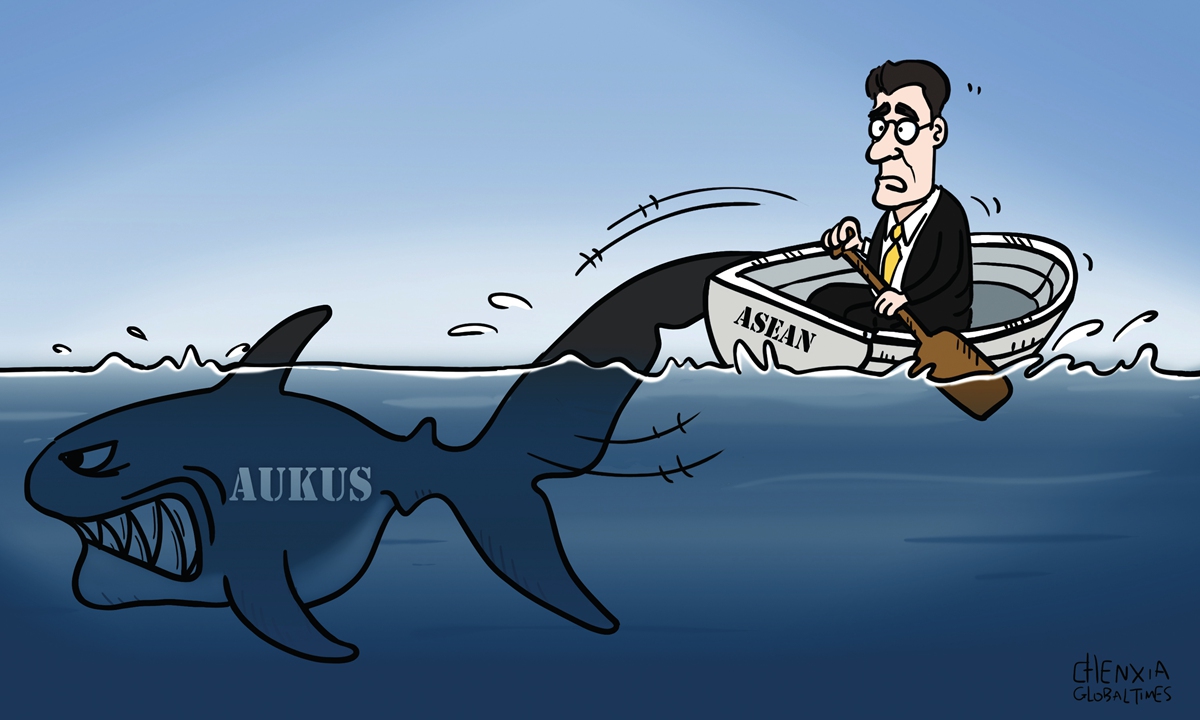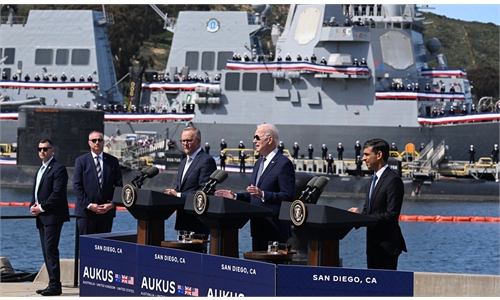
Illustration: Chen Xia/GT
Last week the AUKUS security pact unveiled its first initiative. Australia committed itself to buying eight nuclear submarines over 30 years. The subs, too large for Australia's coastal waters, are designed to prowl China's coastline. Elder statesman Paul Keating described their purpose: "to screw into place the last shackle in the long chain which the Americans have laid out to contain China."In the same week, news broke from Beijing that China had mediated the restoration of ties between Iran and Saudi Arabia.
We live amid "changes unseen in a century," as President Xi Jinping likes to say. A complex system such as the international order can change gradually for years until, suddenly, impossible events and configurations fall into place at blinding speed. We look back to such transitions as times of collapse and revolutionary change.
We are not in normal times. ASEAN should assess its stance toward AUKUS in the context of a fast-changing world order.
The Saudi-Iranian detente astonished the world because it was deemed impossible and made impossible within the imperial, Western order that had subordinated the region as its "Middle East," drawn its borders, delimited its possibilities, pit its people against each other and exploited, then naturalized their divisions. It heralds a new era and a new regional order and geopolitical identity for West Asia as other enmities in the region start to fall like dominos.
Only a "new type of international relations," founded on a different worldview, could have achieved this. The diplomatic principles it applied, such as non-interference and non-alignment, are favored by the non-Western world. They were declared at the Bandung Conference in 1955 and defended by the Non-Aligned Movement. They are the foreign policy principles of China, India and ASEAN. Today they have found their moment as China puts into practice its vision of a "community with a shared future for mankind."
Xi Jinping has arrived in Moscow. President Lula da Silva of Brazil plans to visit Beijing with an almost 300-strong delegation. Mexico wants to join BRICS. The world is changing fast.
Against this background, the nature of AUKUS emerges more clearly.
AUKUS is about a war against China. It was sold to Australians by telling them that the Chinese were on the way to invade them. Australia's newspapers ran a "Red Alert" series of stories describing a pending Chinese invasion, illustrated with images of a Chinese invasion force bound for Australia against a blood-red sky. As with the invasion of Iraq exactly 20 years ago, its proponents will lie to get their war.
Malaysia and Indonesia have expressed unease with AUKUS from the start. They worry it is a provocation that will trigger an arms race that leads to war. They fear it is a projection of military power, by external powers, over the South China Sea, with ASEAN as the mere ground underfoot. They are right to hold this fear.
Both have issued thinly-veiled criticism of AUKUS' lack of transparency and inclusion. Malaysia "underscored the importance of promoting transparency and confidence-building among all countries." Indonesia insisted that maintaining peace and stability is the responsibility of all countries in the region. They are right to feel excluded and left in the dark.
It has been pushed through with secrecy and high-handedness from the start. It bypassed the legislatures of all three countries and was presented as fait accompli. Australian citizens were also excluded and left in the dark.
ASEAN is also right to be skeptical that those subs will only carry conventional weapons. After all, despite the fact that Australia is treaty-bound to prohibit the "stationing of nuclear weapons," the Australian government admitted recently that it is not in a position to ask the US whether "to confirm or deny" that the bombers it bases on Australian soil are at any time nuclear-armed. You need sovereignty to keep your promises.
AUKUS is the speartip for the militarization and polarization of Southeast Asia. It is a raw application of the with-us-or-against-us logic of the rules-based order. It conceives of the region as an arena for the projection of American lethal force. The Indo-Pacific is its map for the encirclement of China with military bases and "forward deployed" assets such as nuclear-capable ballistic missiles and nuclear submarines. In the strategic imagination of the rules-based order, Southeast Asia, larger and more populous than the EU, is just the maritime geography for the projection of a lethal threat on China.
The worldview and purpose of AUKUS are at odds with those of ASEAN. "ASEAN centrality" and the multilateral order around it can only be friction to the desperate project to contain China.
AUKUS dramatizes this desperation in defense of unipolar, white supremacy. Leaning on the internal hierarchy of the Western alliance, it summons forth the white among the white.
It is clear where ASEAN's future lies.
The author is a former Malaysian government official and a senior research fellow at Perak Academy, Malaysia. opinion@globaltimes.com.cn

